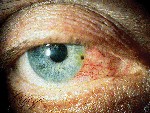Oklahoma optometrists and ophthalmologists are now clear about what surgical procedures optometrists may and may not perform.
The Board of Examiners in Optometry passed a law defining these procedures after ophthalmologists asked the states attorney general if optometrists are licensed to perform any surgical procedure. The attorney general stated that
the wording of the existing state law did not allow or disallow optometrists to perform surgical procedures.
As a result, legislation was passed stating that Oklahoma optometrists could perform non-laser eye surgeries, such as removal of corneal foreign bodies, eyelashes and eyelid lesions. The Board of Examiners in Optometry then issued rules that list the surgeries optometrists may not perform. These rules became permanent in May.
 |
| Oklahoma O.D.s can perform non-laser surgeries, such as corneal foreign body removal. Photo courtesy: Alan G. Kabat, O.D. |
Although Oklahoma optometrists have been performing minor surgical procedures for years, some ophthalmologists are not happy with the legislation. They argue that Oklahoma is the only state that allows optometrists to perform surgery.
Not so, says optometrist David Cockrell, president of the Oklahoma Board of Examiners in Optometry. Optometrists in many states perform the same non-laser surgical procedures being questioned in Oklahoma, he says.
Also, the legislation does not change or attempt to change the scope of practice of Oklahoma optometrists, Dr. Cockrell says. Instead, it enables optometrists in the state to provide the same patient care that they have always provided. For example, optometrists may continue to remove corneal foreign bodies. Because the procedures we already do are termed surgical procedures, we needed to put that language in the statute so that we can bill for those procedures and receive payment, Dr. Cockrell says.
Currently, optometrists may not perform cataract surgery, cosmetic eyelid surgery, retinal surgery or strabismus surgery. However, they can provide postoperative care for patients who undergo these procedures.
As doctors of optometry, we take our training, clinical expertise and commitment to high standards of patient care very seriously, Dr. Cockrell says. Because of this, we do not pursue the practice of procedures for which we have not been trained.

